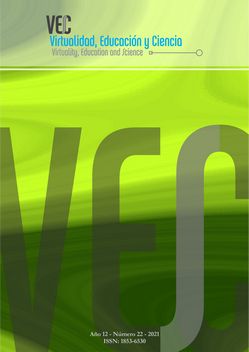Editathons for addressing biases in Wikipedia in Spanish. Analysis of three experiences of collective and simultaneous editing on the free encyclopedia
DOI:
https://doi.org/10.60020/1853-6530.v12.n22.32118Keywords:
collaborative production, Wikipedia, editathon, bias, educational innovationAbstract
The article analyzes three editathons in Wikipedia, in its edition in Spanish. These are collective and simultaneous edition events on the free encyclopedia, aimed at improving coverage of gender, local content and underrepresented groups. The experiences were carried out in Córdoba, Argentina, during 2018 and 2019. The cases are: 1) Editatona de Mujeres Latinoamericanas Arte y Feminismo; 2) Editatón educativo de la ciudad de San Francisco; 3) Editatón: Comunidades originarias del centro de Argentina. We focus on four emerging dimensions: integration of volunteers and institutions; online and offline organization; exploration and recognition of biases; appropriation of the activity. The results show educational potentials in this collaborative knowledge building platform. The methodology is the recording of experiences by researchers-participants, added to the use of secondary sources online.
References
ANDER EGG, E. (2003). Repensando la investigación-acción participante. Colección Política, servicios y trabajo social. Buenos Aires: Lumen-Humanitas.
AIBAR PUENTES, E., DUNAJCSIK, P., LERGA FELIP, M., LLADÓS MASLLORENS, J., MESEGUER ARTOLA, A. & MINGUILLÓN ALFONSO, J. (2016). Guía de recomendaciones y buenas prácticas para editar el contenido científico de Wikipedia. Barcelona: Fecyt; UOC. Disponible en: http://hdl.handle.net/10609/51462
ALEXA (2019). Alexa Top 500 Global Sites. Recuperado el 3 de noviembre de 2019 de http://www.alexa.com/topsites
BBC (2014, 8 de agosto). Wikipedia ‘completely failed’ to fix gender imbalance. Archivo de video. Disponible en: http://www.bbc.co.uk/news/business-28701772
BENKLER, Y., SHAW, A. & MAKO HILL, B. (2015). Peer Production: A Form of Collective Intelligence. En T. Malone & M. Bernstein (Eds.), Handbook of Collective Intelligence. Cambridge: MIT Press.
BRINGEL, B. & VARELLA, R. V. S. (2016). A pesquisa militante na América Latina hoje: reflexões sobre as desigualdades e as possibilidades de produção de conhecimentos. Revista Digital de Direito Administrativo, 3(3), pp. 474-489.
GALLERT, P. & VAN DER VELDEN, M. (2013). Reliable sources for indigenous knowledge: Dissecting Wikipedia's Catch-22. En N. Bidwell & H. Winschiers-Theophilus (Eds.), At the intersection of indigenous and traditional knowledge and technology design. Santa Rosa: Informing Science Press.
GARDNER, S. (2011). Nine reasons women don’t edit Wikipedia (in their own words). Sue Gardner’s blog, 19. En línea https://suegardner.org/2011/02/19/nine-reasons-why-women-dont-edit-wikipedia-in-their-own-words/ [03/11/2019]
FALS BORDA, O. (1990). El problema de cómo investigar la realidad para transformarla. Bogotá: Tercer Mundo Editores.
FREIRE, P. (2007). Cartas a Guinea–Bissau. Apuntes de una experiencia pedagógica en proceso. México: Siglo XXI Editores.
FORD, H., GRAHAM, M. & MEYER, E. (2015). Fact factories: Wikipedia and the power to represent. Doctoral dissertation, University of Oxford.
FORD, H. & WAJCMAN, J. (2017). ‘Anyone can edit’, not everyone does: Wikipedia’s infrastructure and the gender gap. Social studies of science, 47(4), pp. 511-527. DOI: 10.1177/0306312717692172
FUCHS, C. (2017). Social media: A critical introduction. London: Sage.
HOOD, N. & LITTLEJOHN, A. (2018). Hacking History: Redressing Gender Inequities on Wikipedia Through an Editathon. International Review of Research in Open and Distributed Learning, 19(5). DOI: 10.19173/irrodl.v19i5.3549
JENKINS, H., PURUSHOTMA, R., WEIGEL, M., CLINTON, K. & ROBISON, A. J. (2009). Confronting the challenges of participatory culture: Media education for the 21st century. Cambridge: MIT Press.
LERGA FELIP, M. & AIBAR PUENTES, E. (2015). Guía de buenas prácticas para el uso docente de Wikipedia en la Universidad. Barcelona: UOC. Disponible en: http://hdl.handle.net/10609/41661
MAHER, K. (2018, 18 de octubre). Wikipedia is a mirror of the world’s gender biases. Entrada de blog. En línea https://wikimediafoundation.org/2018/10/18/wikipedia-mirror-world-gender-biases/ [03/11/2019]
MINGUILLÓN ALFONSO, J., MENESES NARANJO, J., FÀBREGUES FEIJÓO, S., AIBAR PUENTES, E. & FERRAN FERRER, N. (2018). Are women present, absent or in disguise? Analyzing gender bias in the Spanish Wikipedia. European Symposium Series on Societal Challenges: Bias and Discrimination. Köln, Germany.
KLEIMAN, A. P. & MOISSET, I. (2017, 4 de enero). Visibilizando a las mujeres en la arquitectura. Entrada de blog. En línea https://blog.wikimedia.org/es/2017/01/04/visibilizando-a-las-mujeres-en-la-arquitectura/ [03/11/2019]
MOISSET, I. (2018). Aprendiendo de Wikipedia. Hábitat y Sociedad, (11), pp. 49-64.
NIELSEN, J. (2006). The 90-9-1 rule for participation inequality in social media and online communities.
PAGOLA, L. I. (2016). Perspectiva de género en espacios de construcción colectiva del conocimiento en entornos virtuales: la brecha de género en Wikipedia. En Actas VI Coloquio Interdisciplinario Internacional "Educación, Sexualidades y Género". IV Congreso Género y Sociedad. Universidad Nacional de Córdoba.
REAGLE, J. M. (2010). Good faith collaboration: The culture of Wikipedia. Cambridge: MIT Press.
Strategy/Wikimedia movement/2018-20/es. (2019). Meta. Disponible en: https://meta.wikimedia.org/w/index.php?title=Strategy/Wikimedia_movement/2018-20/es&oldid=19103098.
Training modules/dashboard/editathon (2019). Meta, discussion about Wikimedia projects. Disponible en: https://meta.wikimedia.org/w/index.php?title=Training_modules/dashboard/editathon&oldid=17490043
TRAMULLAS, J. (2016). Competencias informacionales básicas y uso de Wikipedia en entornos educativos. Revista Gestión de la Innovación en Educación Superior, 1(1), pp. 73-88.
Wikimedia Argentina (WMA) (2018). ¿Qué hicimos en 2018? Memoria anual. En línea https://www.wikimedia.org.ar/memoriaanual2018/ [03/11/2019]
Wikimedia Foundation (WMF). (2019, 21 de octubre). Wikimedia Statistics. En línea https://stats.wikimedia.org/v2/#/es.wikipedia.org [03/11/2019]
Wikipedia (2019, 30 de junio). Análisis de visitas. Disponible en: https://tools.wmflabs.org/pageviews/?project=es.wikipedia.org&platform=all-access&agent=user&start=2018-07&end=2019-06&pages=Comechingones.
Wikipedia Education Program/es (2017). Meta. En línea https://meta.wikimedia.org/w/index.php?title=Wikipedia_Education_Program/es&oldid=16239575 [03/11/2019]
Wikipedia: políticas y convenciones (2019, 3 de octubre). Wikipedia, La enciclopedia libre. Disponible en: https://es.wikipedia.org/wiki/Wikipedia:Pol%C3%ADticas_y_convenciones
Wikipedia: Sesgo intrínseco (2019). Disponible en: https://es.wikipedia.org/wiki/Wikipedia:Sesgo_intr%C3%ADnseco
ZANOTTI, A. (2014). Desarrollo colaborativo de software libre en la Argentina: la experiencia de un hackatón cordobés. Question, 44(1), pp. 373-384.
Downloads
Published
Versions
- 2021-03-07 (2)
- 2021-02-11 (1)
Issue
Section
License
Copyright (c) 2021 Lucas Aimar, Lila Isabel Pagola , Agustín Zanotti

This work is licensed under a Creative Commons Attribution-NonCommercial 4.0 International License.
The generation of derivative works is allowed as long as it is not done for commercial purposes. The original work may not be used for commercial purposes.


